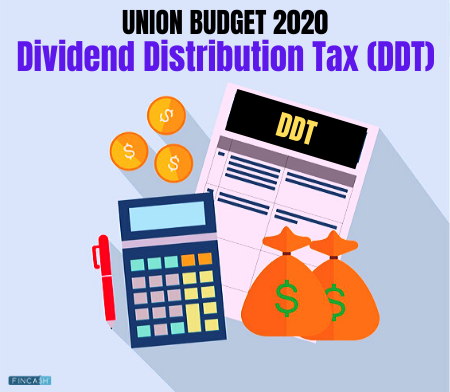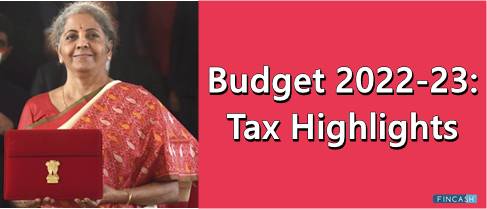Union Budget 2020: Impact on Dividend Distribution Tax (DDT)
The Union Budget of 2020 brought some major changes in Dividend Distribution Tax (DDT). DDT was introduced in 1997 and over a period of time, it received a lot of criticism for unnecessarily burdening companies.
But before we can get into the details of those changes, let us first understand what Dividend Distribution Tax is all about.

What is Dividend Distribution Tax (DDT)?
A dividend is a return that a company gives to its shareholders out of the profits it earned in the year. This payment is an Income to the shareholders and should be subject to income tax. However, the income tax law in India provides an exemption of the dividend income received from the Indian companies by the investors by imposing the DDT. However, DDT is levied on the company and not the shareholders.
Dividend Distribution Tax Scrapped (for companies)
Finance minister, Nirmala Sitaraman, declared the scrapping of Dividend Distribution Tax (DDT) for companies during the Union Budget 2020. This move has brought in some drastic changes in the lives of the Indian investor.
Before this could be scrapped, DDT was levied on the company paying the dividend to its shareholders, but now it will be levied on the shareholders themselves. The shareholders will be taxable for any income that comes from their investments in a company’s shares or Mutual Funds. The recipient of the dividend will be required to pay the income tax at the current applicable rates no matter how much he earns through the dividend. The burden will now completely be in the hands of the shareholders and not the company.
Up until now, companies were required to pay DDT at 15%, but the effective rate would come out to be 20.56%.
Talk to our investment specialist
Companies that Paid High Dividends
Companies have been paying huge dividends to their shareholders before the recent scrapping of DDT.
Here is a list of them:
| Companies | Companies |
|---|---|
| Tata Consultancy Services (TCS) | Infosys |
| Indian Oil | ONGC |
| Hindustan Zinc | Coal India |
| HDFC | ITC |
| Vedanta | NTPC |
| HUL | BPCL |
| Reliance Industries | Procter & Gamble Health |
| Graphite India | National Aluminium Company |
| Setco Auto | SJVN |
| REC | NLC India |
| Balmer Lawrie & Company | NHPC |
| Indian Oil Corporation | Hindustan Petroleum Corporation |
How will it Impact the Shareholders?
Surprisingly, the decision to scrape DDT out of the companies’ books will be of both gain and loss to the masses. Let's take a look at people who will benefit and people who will lose out on the benefits this tax season.
Positive Impact of DDT
Retail Investors (Income of Rs. 10 lakh p.a.)
The scrapping of DDT is a gain for retail investors who have an income of Rs.10 lakh p.a. because they will be exempted from 20.56% imposed on their dividend receipts when their own tax-slab rates are much lower.
Domestic Mutual Funds/Asset Managers
They are in for a win since they will be exempted from suffering the indirect incidence of DDT. They can also pocket larger divided incomes from their portfolios.
Corporate Foreign Portfolio Investors (FPIs)
Corporate FPIs can now pay tax on dividends earned in India at either 20% or lower rates, according to the tax treaties written by their home countries. This could also be as less as 5% in certain cases.
MNCs
Multinationals and foreign companies that receive dividends from their Indian branches will also enjoy tax benefits similar to corporate FPIs.
Negative Impact of DDT
Individual investors
Individual investors in stocks whose income is more than Rs. 10 lakh p.a. will have to shell out a tax of 31.2% on their dividends, instead of a Flat 20.56% under the Dividend Distribution Tax (DDT).
Investors with an income of Rs. 50 lakhs, Rs. 1 crore and Rs. 2 crores will have a huge surcharge on their dividend income. This means that they will have to part with an effective tax of 34.3%, 35.8% and 39% on their dividend income.
Equity investors with an income of over Rs. 5 crores a year will have to pay 42.74% tax on their dividend receipts.
Government and Corporate Promoters
They are likely to fall in the Rs. 5 crore category and will have to pay up the 42.74% effective tax on dividends.
Insurance companies
Insurance companies and other corporate shares’ investors, who don’t enjoy the benefit of status like mutual funds, may experience a hit on their income from paying the tax rates.
Individual NRI Investors/Non-Corporate FPIs
NRI investors and non-corporate FPIs won’t be able to gain any benefit of a 20% Tax Rate on dividends enjoyed by their peer foreign investors. They may need to pay Taxes at their slab rates.
Moreover, Indian companies are expected to enjoy the benefits. It will increase their distributable profitability. It will also help them save more cash, which will attract higher investment.
Conclusion
Dividend Distribution Tax (DDT) was definitely a surprise to the investment Market. However, understanding how to invest in the current scenario would be of profit to the investor.
All efforts have been made to ensure the information provided here is accurate. However, no guarantees are made regarding correctness of data. Please verify with scheme information document before making any investment.









